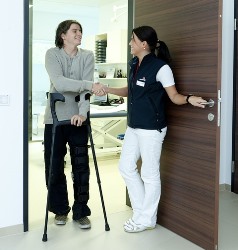How to Choose the Right LVN or LPN Program Near Boston Massachusetts
 Now that you have decided on a rewarding vocation in the field of nursing, it's imperative that you select a Licensed Practical Nurse (LPN) program near Boston MA that will deliver the appropriate education. If you reside in Texas or California, then you will be searching for a Licensed Vocational Nurse (LVN) school instead. There is no difference, except for the names, between an LPN and an LVN. They both perform the same job functions and work in health care facilities under the supervision of Registered Nurses (RN) or Doctors. But their duties do fluctuate depending on the state they practice in, which we will talk about in the following segment. When initiating their search for schools, many potential nursing students start with the ones that are the closest to their homes or that are the least costly. Even though tuition and location are important points to consider, they are not the only criteria that you should base your selection on. Other variables, such as if the schools are accredited or have high pass rates on the licensing exam are very important too. There are additional questions that you should ask potential schools before enrolling in a LPN or LVN training program that we will address later in this article. But to start with, let's have a look at the role of an LPN and what is involved in the instruction and licensing process.
Now that you have decided on a rewarding vocation in the field of nursing, it's imperative that you select a Licensed Practical Nurse (LPN) program near Boston MA that will deliver the appropriate education. If you reside in Texas or California, then you will be searching for a Licensed Vocational Nurse (LVN) school instead. There is no difference, except for the names, between an LPN and an LVN. They both perform the same job functions and work in health care facilities under the supervision of Registered Nurses (RN) or Doctors. But their duties do fluctuate depending on the state they practice in, which we will talk about in the following segment. When initiating their search for schools, many potential nursing students start with the ones that are the closest to their homes or that are the least costly. Even though tuition and location are important points to consider, they are not the only criteria that you should base your selection on. Other variables, such as if the schools are accredited or have high pass rates on the licensing exam are very important too. There are additional questions that you should ask potential schools before enrolling in a LPN or LVN training program that we will address later in this article. But to start with, let's have a look at the role of an LPN and what is involved in the instruction and licensing process.
It Only Takes a Few Minutes to Start Your LPN or LVN Career Below
Job Duties of an LPN or LVN

A licensed practical nurse cares for the basic medical needs of a patient by monitoring their blood pressure and other vital signs and providing the person with the necessities of basic comforts like bathing or other needs. LPNs work in a variety of health care systems. Settings can range from Boston MA clinics, hospitals, nursing homes, rehabilitation centers, extended care facilities, clinics, and even private practices. Depending on each state’s regulations, LPNs may be involved in medical care such as inserting catheters, intravenous drips (IVs), assisting to deliver babies, or giving approved medication. They would be responsible for keeping accurate records of a patient such as their history, diagnosis, progress, and any new medical problem that may occur and inform the doctor or registered nurse. He or she is overseen by a doctor or registered nurse. Many facilities require work hours to exceed the normal 8-hour shifts. Therefore, according to the National Federation of Licensed Practical Nurses, it’s necessary to have physical strength and stamina due to the direct care to patients you will provide. An LPN should be compassionate, patient in difficult situations, and have interpersonal skills. They should have the ability to communicate clearly and be an attentive listener.
LPN and LVN Programs
After deciding on the type of program to pursue, students need to find one approved by their state. Each state establishes its own educational requirements for LPNs and approves the schools offering credentials. Most yearlong programs are offered by junior colleges, hospitals, community colleges or technical schools, and provide the opportunity for supervised practical nursing clinical experience. In some cases applicants can get a head start by completing prerequisites in mathematics, chemistry, biology, English and psychology prior to enrolling; however, these are not always required so students should check their program’s requirements first. Admission varies by state, although applicants need at least a high school diploma or equivalent to enroll in a nursing certificate or diploma program. Additionally, some schools may require applicants to pass an entrance exam prior to acceptance to an LPN certificate program. Upon completion of an approved LPN/LVN diploma or certificate program, graduates sign up to take the National Council Licensure Examination for Practical Nurses (NCLEX-PN). All states and the District of Columbia mandate the NCLEX-PN competency exam as a core requirement to be employed as an LPN.Taking LVN and LPN Classes Online
 Enrolling in LPN programs online is becoming a more popular way to obtain instruction and earn a nursing certificate or degree in Boston MA. Some schools will require attending on campus for a component of the training, and virtually all programs call for a certain amount of clinical rotation hours conducted in a local healthcare facility. But since the balance of the training can be accessed online, this alternative may be a more accommodating approach to finding the time to attend college for some students. Pertaining to tuition, some online degree programs are cheaper than other on campus alternatives. Even additional expenses such as for commuting and study materials can be lessened, helping to make education more economical. And numerous online programs are accredited by U.S. Department of Education recognized organizations. Therefore if your job and household responsibilities have left you with little time to work toward your academic goals, maybe an online LPN program will make it easier to fit a degree into your active schedule.
Enrolling in LPN programs online is becoming a more popular way to obtain instruction and earn a nursing certificate or degree in Boston MA. Some schools will require attending on campus for a component of the training, and virtually all programs call for a certain amount of clinical rotation hours conducted in a local healthcare facility. But since the balance of the training can be accessed online, this alternative may be a more accommodating approach to finding the time to attend college for some students. Pertaining to tuition, some online degree programs are cheaper than other on campus alternatives. Even additional expenses such as for commuting and study materials can be lessened, helping to make education more economical. And numerous online programs are accredited by U.S. Department of Education recognized organizations. Therefore if your job and household responsibilities have left you with little time to work toward your academic goals, maybe an online LPN program will make it easier to fit a degree into your active schedule.
Things to Ask LPN and LVN Programs
Now that you have decided on obtaining your LPN certificate, as well as if you will attend classes on campus or on the internet, you can utilize the following pointers to start narrowing down your choices. As you no doubt are aware, there are a large number of nursing schools and colleges near Boston Ma as well as within Massachusetts and throughout the United States. So it is essential to reduce the number of schools to choose from in order that you will have a workable list. As we already discussed, the site of the school as well as the price of tuition are undoubtedly going to be the initial two things that you will consider. But as we also emphasized, they should not be your only qualifiers. So before making your final decision, use the following questions to evaluate how your pick measures up to the field.
- Accreditation. It's a good idea to make sure that the certificate program in addition to the school are accredited by a U.S. Department of Education acknowledged accrediting organization. Besides helping confirm that you receive a quality education, it may help in securing financial aid or student loans, which are often not provided for non-accredited schools near Boston Massachusetts.
- Reputation. Visit internet rating services to see what the reviews are for each of the LPN schools you are looking into. Ask the accrediting organizations for their reviews as well. In addition, contact the Massachusetts school licensing authority to check out if there are any complaints or compliance issues. Finally, you can contact some local Boston MA healthcare organizations you're interested in working for after graduation and ask what their judgements are of the schools as well.
- Internship Programs. The most effective way to get experience as a Licensed Practical Nurse is to work in a clinical environment. Essentially all nursing degree programs require a specific number of clinical hours be completed. Various states have minimum clinical hour mandates for licensing also. Ask if the schools have associations with nearby Boston MA community hospitals, clinics or labs and assist with the positioning of students in internships. Also, it's important that you choose a school that offers clinical training in the type of facility you are most interested in. For example, if you want training and experience in pediatric care, make sure that the school you choose provides adequate clinical rotation in an area Pediatric Hospital.
- Licensing Preparation. Licensing prerequisites for LPNs are different from state to state. In all states, a passing score is required on the National Council Licensure Examination (NCLEX-PN) as well as graduation from an approved school. Certain states require a specific number of clinical hours be completed, as well as the passing of additional tests. It's essential that the school you are enrolled in not only delivers an outstanding education, but also readies you to meet the minimum licensing standards for Massachusetts or the state where you will be practicing.
- Graduation and Job Placement Rates. Find out from the LPN schools you are looking at what their graduation rates are as well as how long on average it takes students to finish their programs. A low graduation rate may be an indication that students were displeased with the program and dropped out. It's also imperative that the schools have high job placement rates. A high rate will not only verify that the school has a good reputation within the Boston MA medical community, but that it also has the network of contacts to assist students gain employment.
- NCLEX Exam Pass Rate. Once you receive your certificate or diploma, you must sign up for and pass the National Council Licensure Examination for Practical Nurses (NCLEX-PN). Enrolling in a school with at least a 75% pass rate is highly preferred. Lower pass rates may indicate that a school’s program, curriculum or instructors are ineffective in teaching its students. You can find out from the school what their passing rate is for the last 5 years, or request the information from the State Board of Nursing.
Learn How to Become an LVN or LPN in Boston
Choose the Best Boston Licensed Practical Nurse Training
Selecting the ideal Licensed Practical Nurse program is potentially the most crucial first step to launching a new career in the medical care industry. There are a number of factors that you must take into account when choosing a nursing school. These factors will be prioritized differently depending on your current career objectives, obligations, and financial status. As we have stressed in this post, it is critical that you enroll in an LPN college and a certificate or degree program that are each accredited and have outstanding reputations within the medical community. By using our list of qualifying questions, you will be able to produce a shortlist of schools to choose from so that you can make your ultimate selection. And with the proper degree and training, combined with your hard work and ambition to succeed, you can become a Licensed Practical Nurse in Boston Massachusetts.
BOSTON LPN OR LVN CLASSES ONLINE | BOSTON LPN OR LVN COURSES ONLINE
